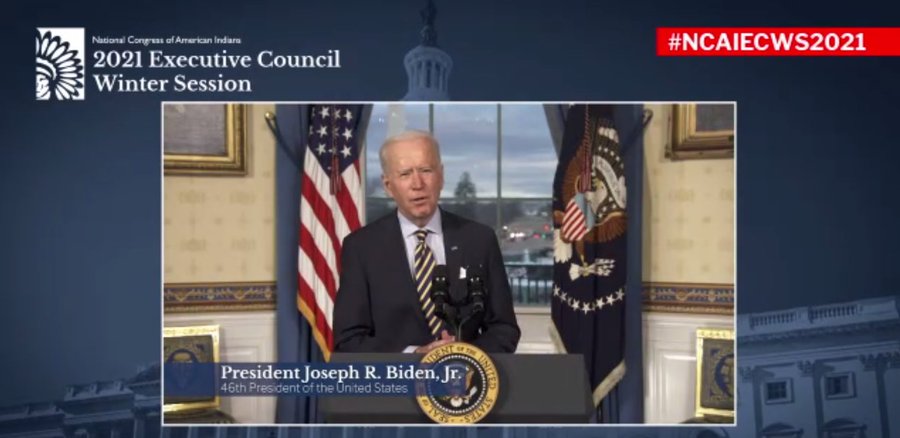
- Details
- By Nanette Deetz
WASINGTON — With just over one month into his term, President Joe Biden addressed the National Congress of American Indians (NCAI) 2021 Winter Session virtually last week. Because of the ongoing Covid-19 pandemic, NCAI decided to hold its annual winter session remotely this year. Typically, hundreds of tribal leaders would have gathered in Washington, D.C. for the conference that allows for interaction between tribal leaders and administration and members of Congress.
NCAI’s Winter Session met from Feb. 21 through Feb. 26.
President Biden addressed the Winter Session on Tuesday, Feb. 23. Tribal leaders were pleased president addressed the conference because during the 2020 presidential campaign, the he promised to work closely with Indian Country. In his virtual message, President Biden reiterated his administration’s commitment to Indian Country.
"I promise you as President I'm committed to working with you to write a new and better chapter in the history of our nation to nation relationship. From health disparities to gaps in economic opportunities we see how indigenous communities still live, still thrive in the shadow of a long and painful legacy of broken promises."
So far, the Biden administration has already proven its willingness to work closely with Indian Country. For example, the new administration has already appointed 20 Native Americans to various positions within the federal government. Some key Native American appointments in the Biden administration include:
- Waleah Johns (Diné) is the senior advisor for the U.S. Dept. of Indian Energy, Policy, and Programs, and is undergoing the process to become its Director.
- Heather Dawn Thompson (Oglala Sioux Tribe), who now living on the Cheyenne Indian reservation in South Dakota, is director of the Office of Tribal Relations at the U.S. Dept. of Agriculture (USDA).
- Bryan Newland (Bay Mills Indian Community, is now the principal deputy assistant to the Secretary of Indian affairs at the U.S. Dept. of the Interior.
- Libby Washburn (Chickasaw) serves as the special assistant to the President on Native Americans for the White House Domestic Policy Council.
- Jaimie Pinkham, Nez Perce, has been appointed principal deputy assistant secretary for the Army in Civil works. This appointment is one of two that oversee the Army Corps of Engineers civil works program.
- Paawee Rivera, Pojoaque Pueblo serves now as senior advisor for
- intergovernmental affairs and director of tribal affairs at the White House.
One of President Biden’s first actions upon taking office signed a Presidential Memorandum that reaffirms tribal sovereignty through tribal consultation.
"There is much, much more we have to do, but I am confident we can make progress", said President Biden.
Earlier on Tuesday, NCAI President Fawn Sharp, who serves as the president of the Quinault Nation in Washington state, implored Indian Country to speak with "one voice, one conscience, one heart.”
President Sharp, who is only the third woman to lead NCAI, also reminded attendees that the National Congress of the American Indian was formed in 1944, and as such is the oldest organization formed during the 20th century to bring all of our tribes together. President Sharp also reminded everyone that Native American veterans have served in the U.S. military, in all of its various forms and often with high honors, both men and women, at a higher percentage than any other racial or ethnic groups.
President Sharp said that the NCAI (National Congress of American Indian) serves now as a major philanthropic organization to allocate resources out to Indian Country because "we are properly recognized in Congress. You simply can't ignore us anymore.”
Also, on Tuesday Senate Majority Leader Chuck Schumer (D-NY) told NCAI attendees that the Senate will no longer be a legislative graveyard and we will be aggressive in confirming nominations.
“Every time we consider giving money to communities we must have tribal nations at the top of the list, That is something I promised before I became Majority Leader, got done in the first bill, and now we are doing it even bigger in this bill, and I will continue to work with you on that,” referencing the stimulus bill now under consideration by the Senate, Schumer said.
Speaker of the House Nancy Pelosi (D-CA) also renewed Congress’ commitment to include Indian Country in legislation.
At the end of the Pelosi’s address to NCAI, Pechanga Band of Luiseno Indians Chairman Mark Macarro told her the process under the CARES ACT in the last administration was a "complete disaster” for tribes.
Macarro asked that both Schumer and Pelosi write letters to the U.S. Treasury Department and to the Interior Department addressing the true intention of Congress for funds earmarked for tribal nations. The tribal chairman was alluding to how funds were sent to Alaska Native Corporations (ANCs) last year. He suggested the letters include specific language on how funds will be distributed this time.
Pelosi committed to writing the letter and admitted that the issue of Native funding and how CARES Act funds were released was a problem.
Pelosi expressed she appreciates Indian Country’s offer to combat climate change.
"We owe you tribes so much and we learned so much from you. When the planet is at stake, who better than Indian Country to lead the way,” Pelosi said.
More Stories Like This
Native News Weekly (August 25, 2024): D.C. BriefsDeb Haaland Earns Endorsement From Communications Workers of America Local 7076
University Soccer Standout Leads by Example
Two Native Americans Named to Democratic Congressional Campaign Committee's“Red to Blue” Program
Cheyenne River Youth Project Hosts Young Women’s Winter Camp as Part of Lakota Culture Internship
Help us defend tribal sovereignty.
At Native News Online, our mission is rooted in telling the stories that strengthen sovereignty and uplift Indigenous voices — not just at year’s end, but every single day.
Because of your generosity last year, we were able to keep our reporters on the ground in tribal communities, at national gatherings and in the halls of Congress — covering the issues that matter most to Indian Country: sovereignty, culture, education, health and economic opportunity.
That support sustained us through a tough year in 2025. Now, as we look to the year ahead, we need your help right now to ensure warrior journalism remains strong — reporting that defends tribal sovereignty, amplifies Native truth, and holds power accountable.
 The stakes couldn't be higher. Your support keeps Native voices heard, Native stories told and Native sovereignty defended.
The stakes couldn't be higher. Your support keeps Native voices heard, Native stories told and Native sovereignty defended.
Stand with Warrior Journalism today.
Levi Rickert (Potawatomi), Editor & Publisher

